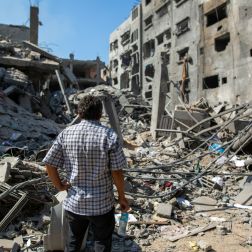- 4 mins read time
- Published: 12th January 2022
Starting over, once again

Oxfam providing support to families in Iraq who have been twice displaced
For Nur and her family, the last few years have been a series of uprootings. In 2016, she, her husband Muhammed, and their children were forced from their home near Mosul during the war on ISIS.
“I remember like it was yesterday,” she says. “We left our house due to airstrikes, and we moved to the next village over, for six months, but we were forced to leave when ISIS threatened us.”
Nur was part of a migration of more than a million people who had to leave their homes in search of stability during the conflict with ISIS. Her family eventually settled in a camp for displaced people in Iraq. The transition was difficult, especially for the children. “There was no education for the kids,” she recounts. “[There was] no proper home to keep them in.”
While Iraqi Prime Minister Haider al Abadi declared victory over the Islamic State in Iraq in 2017, families like Nur’s remained in the camps, unable to return home. Years of intense fighting has left buildings uninhabitable. And with few sources of income, and limited basic services, including clean water and electricity, families are struggling to survive.
Earlier in 2021, the camp Nur’s family had sought refuge in was shuttered. People living there were only given one week’s notice. After four years away, they scrambled to plan their returns home.
“We did not know that where our house had been, there was now nothing but bare ground,” Nur says. “There [are] no income opportunities in our village.”
The IDP camp Nur’s family left was not the only one to close—a recent string of camp closures in Iraq has created a surge of movement. Thousands of people have been sent back to their place of origin. Returning residents currently outnumber the job opportunities available.
“The moment I arrived it was like a new place,” she shares. “I did not recognize the village – everything was gone. So I spent the day in my relative’s house where there were already four families in one place, and then I slept in the tent with my kids as there is no space for us there.”
Nur and Muhammed have sought out work as day laborers to help cover their most basic needs. So far, they’ve had no luck. “When I wake up in the morning, the first thing I do is ask around to find if there are any job opportunities,” says Nur.
They have considered moving to Mosul city to find work but Nur says the cost of living there is too high.
“It’s very hard to keep up with the children’s expenses. One of my children is sick and I can’t take him to the doctor.”
They have been borrowing money to meet their costs, but Nur knows that it is not sustainable to keep going. The family is now over 500,000 Iraqi dinar (USD$340) in debt, with no hope of paying it back.
How Oxfam is helping displaced families in Iraq
Nur describes the process of migrating to the camp and back as “starting from nothing twice.” Oxfam is alleviating some of the stress for families like Nur’s who are having to rebuild their lives once again by providing basic items to help them survive this transition, such as portable stoves and heaters, solar lamps, jerry cans, and mattresses and bedding.
So far, Oxfam has reached over 40,000 people with essential items, cash, and information about where to access basic services. We are supporting displaced and returning families with kits like the one Nur’s family is receiving. For people who have experienced specific traumas, such as survivors of gender-based violence, we are also working to provide specialized support.
“We are thankful for this very essential support,” says Nur. “Without it we could have been sleeping on the floor with my kids. I do not wish anyone to go through any of this.”
You can support families around the world, who like Nur’s, are working to escape poverty.




